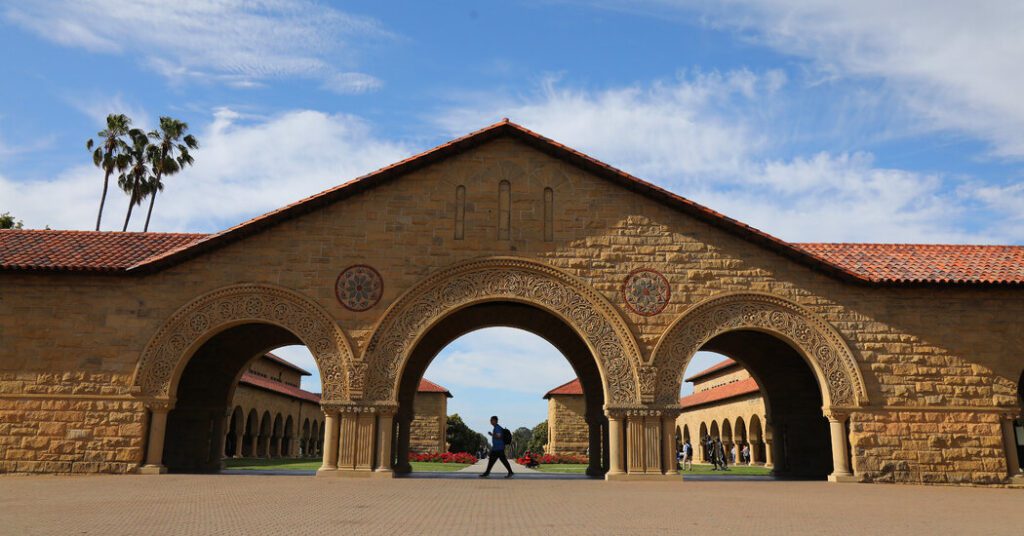Stanford University released conflicting reports on campus culture on Thursday — one on anti-Semitism, the other on anti-Muslim bigotry — that reveal conflicting pictures of campus life in recent months that are perhaps impossible to reconcile.
One report cited widespread overt and subtle anti-Semitism on campus, while the other said the university suppressed the free speech of pro-Palestinian students and faculty. These are emblematic of the rift between Jewish and Muslim groups on campus and show that any agreement between them and the university is far from over.
The report is one of the first to examine universities' responses to the protests against Israel's military operation in Gaza and the surge in pro-Israel protests. Over the past year.
As students across the country march, camp out, and in some cases get arrested on campus, universities are facing the difficult task of balancing student freedom of speech with campus safety. At Stanford University a few weeks ago, 13 pro-Palestinian protesters were arrested after barricading themselves in the president's office.
The report on anti-Semitism, prepared by the university's Subcommittee on Anti-Semitism and Anti-Israel Bias, which is made up of faculty, students and alumni, found that anti-Semitic acts ranged from anonymous threats on social media against student journalists who wrote about anti-Semitism to what students said were intimidating attacks in classrooms and dorms.
“Anti-Semitism is widespread and pernicious on Stanford's campus today,” the group wrote in its report. “We have seen cases where anti-Semitism and anti-Israel prejudice have reached a level of societal harm and have had a profound effect on people's lives.”
Jewish students complained that they had been “tokenized,” or seen as interchangeable representatives of the Jewish people, according to the report, adding that many of the targeted students were critical of the Israeli government. They were pressured to “publicly denounce Israel and renounce any ties to Israel,” the report said, noting that this was the most common form of anti-Semitism experienced by students.
“The hostility directed at them appears to have little or nothing to do with their political views, but rather with their unwillingness to qualify or reject their Jewish or Israeli identities, or at least their ties, however ancestral, to the State of Israel with any bitter apology,” the report said.
Specific examples of anti-Semitic acts cited in the report included social media messages calling for a student journalist who wrote an essay about anti-Semitism to be “gasboarded and set on fire,” a lecturer who told students that “only six million” Jews died in the Holocaust and compared it to 12 million deaths in colonial Belgium, and a mezuzah, a religious amulet, being ripped off a student's door frame.
Another report, by Stanford's Muslim, Arab and Palestinian Community Committee, described a “break in trust” among students, staff and faculty. “These communities fear for their safety because they feel unseen and unheard by university leadership,” it said.
According to the report, Stanford recorded more than 50 incidents of Islamophobia, anti-Palestinian and anti-Arab bigotry, including assaults, injuries and theft, between October 2023 and May 2024. This is a 900 percent increase from the previous two academic years, the report said.
Examples include a threatening email sent by a Stanford University graduate to two undergraduates from Students for Justice in Palestine (with the subject line “You're on our university's terrorist list!”), a professor scolding students for pro-Palestinian protests and accusing them of “Islamic Jihad and Hamas activity,” and a printout of the Palestinian flag that had been torn in half and ripped from a student's room door.
The report also discussed the “Palestine exception” in the university's approach to free speech, saying the university restricted protests and speech by pro-Palestinian students when displaying flags or signs or organizing screenings of news programs.
“For members of the Muslim, Arab and Palestinian communities, Stanford's decisions have diminished a sense of equality, inclusion and belonging on campus,” the report states. “These decisions also sent a message to the entire university that Palestine is an exception to Stanford's stated mission and a subject that cannot be studied, discussed or taught without potentially damaging future outcomes.”
The report is the product of special investigative teams set up at universities across the country in the wake of the Hamas-led attack on Israel on October 7, which sparked protests and exacerbated divisions on university campuses.
The gap between the two groups at Stanford appears to remain large, and even the university's president, Richard Thaler, acknowledges this.
“At Stanford, we are committed to creating a campus environment that is welcoming to people of all backgrounds, faiths, nationalities and perspectives,” Salah said in a statement. “The painful events of the past few months have made it clear that we have much work to do to achieve that goal.”

